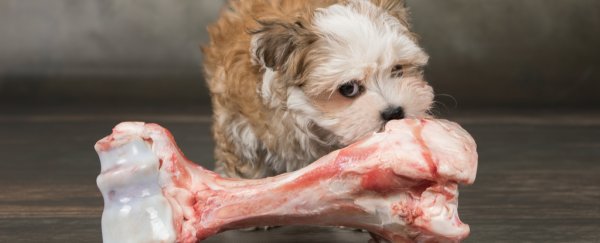New research is giving pet owners food for thought, suggesting having a carnivorous companion contributes significantly to global warming.
We humans can forgo a good rib-eye for a mushroom ragù in the name of reducing our carbon footprint, but cats and dogs don't have much of a choice. Now one scientist has crunched the numbers on how the meat our pets eat also impacts the environment, and it's not pretty.
Gregory Okin from the University of California, Los Angeles, isn't anti-pet, and certainly isn't out on a crusade to encourage people to give Rover tofu for dinner.
"I like dogs and cats, and I'm definitely not recommending that people get rid of their pets or put them on a vegetarian diet, which would be unhealthy," says Okin.
"But I do think we should consider all the impacts that pets have so we can have an honest conversation about them. Pets have many benefits, but also a huge environmental impact."
The livestock we raise to produce everything from beef burgers to pulled pork is considered responsible for releasing around 6 billion tonnes of greenhouse gases into the atmosphere each year, or roughly a fifth of all our carbon emissions.
As much as a third those gases come straight from the animal's digestive systems, while the rest is the result of incidental factors such as land-clearing for grazing and gases released while producing livestock feed.
Developing countries are responsible for about 70 percent of those emissions, a consequence of the population's heavy reliance on livestock for a range of resources.
Now Okin has analysed the proportion of emissions the US contributes by feeding their 163 million cats and dogs.
His number? The annual equivalent of 64 million tonnes of carbon dioxide.
That figure is a sizeable proportion of the estimated US total of 260 million tonnes of CO2 equivalent produced by raising livestock, meaning our love of owning a carnivorous animal comes at a significant cost to the environment.
Not that it need be that way, according to Okin. Our desire to anthropomorphise Mr Twinkles means we tend to throw in some choice cuts of protein rather than make use of animal parts that would be wasted.
"A dog doesn't need to eat steak," he says.
"A dog can eat things a human sincerely can't. So what if we could turn some of that pet food into people chow?"
By Okin's estimates, shifting a quarter of the meat in pet food to our own plates and replacing it with something less appetising could equal the amount of meat consumed by 26 million Americans – about the population of Texas.
While the analysis focusses primarily on the US, it's a problem that stretches across the globe. As countries become more affluent, luxuries such as adopting pets as family members become more common.
And nobody wants to give a beloved family member minced pig snout and lamb guts for brunch.
Another simple alternative is for prospective pet owners to consider finding a vegetarian friend, such as a rabbit, a parrot, or a hamster.
Every little bit can help.
"I'm not a vegetarian, but eating meat does come at a cost," says Okin.
"Those of us in favour of eating or serving meat need to be able to have an informed conversation about our choices, and that includes the choices we make for our pets."
One of the goals of the Paris Agreement on climate change is to limit the global temperature rise to 2 degrees Celsius above what it was in pre-industrial times.
We've already hit the 1 degree threshold, and even if humans (and their pets) vanished this instant the momentum would see this figure continue to climb.
A world where we can't spoil our pets isn't an appealing one, but giving a dog a bone or bowl of pink slime we wouldn't eat ourselves is a small sacrifice to make if we want to keep that temperature rise down to a minimum.
This research was published in PLOS One.
